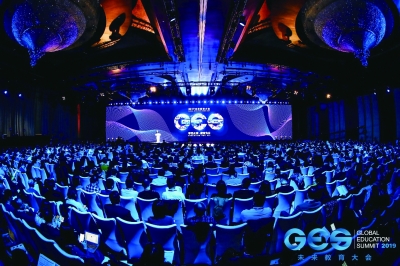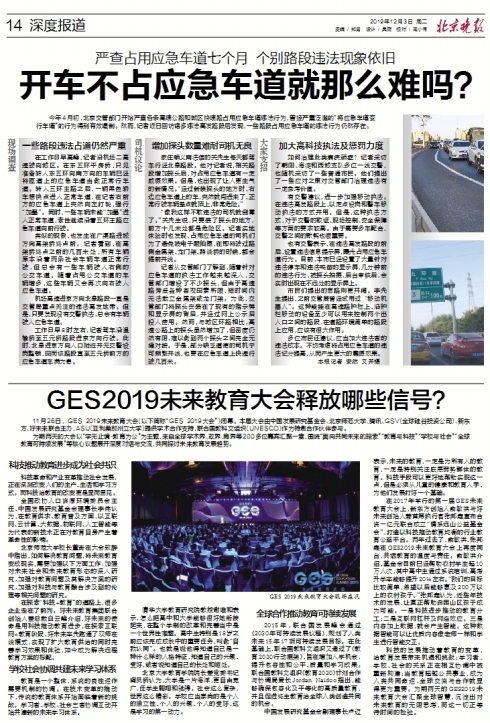





The Scene of GES 2019 Future Education Conference
On November 26, the GES 2019 Future Education Conference (hereinafter referred to as "GES 2019 Conference") closed. The conference was jointly hosted by the China Development Research Foundation, Beijing Normal University, Tencent, GSV (Global Silicon Valley Investment Company), New Oriental, and TAL Education Group, with academic support from Arizona State University (ASU) and special cooperation from the United Nations Educational, Scientific and Cultural Organization (UNESCO).
The two-day conference, with the theme “Learning without Boundaries, Education for All,” brought together more than 200 guests from the global academic, political, and business communities, to engage in in-depth dialogue and exchanges on core issues such as "Exploration for a Common Future," "Education and Technology," "School and Society," and "Global Sustainable Development of Education," in order to jointly explore the future trends in education.
Consensus on Technological Advancement in Education
Technological revolution and industrial changes are driving social development, profoundly changing people's production, life, and learning methods. The changes that technology has brought to education are even more obvious.
Liu Mai, Vice Chairman of China Development Research Foundation, said that new technologies such as the Internet, cloud computing, big data, the Internet of Things, and artificial intelligence are revolutionizing education in terms of supply and demand, and the popularization of education.
Dong Qi, President of Beijing Normal University, pointed out in his address that solving educational challenges and turning future education into reality requires strengthening the following: in-depth research on future society and future forms of education, research on educational challenges and solutions, and research on ethical issues related to the integration of technology and education.
In the exploration of the "Technology + Education" path, many enterprises are at the forefront. Bai Yunfeng, Co-founder and President of TAL Education Group, introduced that TAL's mission is to promote educational progress through technology. In the exploration stage of Internet + education, TAL has taken the lead in implementing the dual-teacher online model, achieving the dual goals of expanding educational supply and improving learning effects and experiences, and has now become a standard solution for distance education.
Coordinated and Co-constructed Future Learning System by Schools and Society
Education is an integrated entity, and the healthy operation of the system requires coordinated mechanisms. Driven by technological change, traditional education systems are facing new challenges. The interaction and coordination of learners, schools, and society are collectively constructing a new future learning system.
Xie Weihe, Professor at the School of Education of Tsinghua University, stated that connecting high school and college education and improving the entire education system is a challenging task on a global scale. Before they are 18, high school students should complete the important task of growth, known as "self-identity." This means they need to know what kind of personality traits they have, know their interests and hobbies, or know their strengths and weaknesses.
Yan Fengqiao, Dean and Party Secretary of the School of Education of Peking University, believes that universities are like vast oceans, more free and spacious, allowing students to soar and gallop. The world is so complex, and society is so wonderful. What schools should advocate is the independence, interests, and hobbies of individuals, which is the first motivation for learning.
Global Cooperation Promoting Sustainable Development of Education
In 2015, the United Nations Development Summit adopted the "2030 Agenda for Sustainable Development," planning 17 sustainable development goals for the next 15 years. Based on this, UNESCO adopted the "Education 2030 Framework for Action," aiming to increase access to education, enhance inclusiveness and equity, quality, and learning outcomes. Jordan Naidoo, Director of the Division for Support and Coordination at UNESCO, pointed out that high-quality education that ensures inclusiveness and equality, and promotes lifelong education, creates equal opportunities for global humanity.
Luo Mai, Vice Chairman of the China Development Research Foundation, said that future education must be for everyone, especially focusing on the education of disadvantaged groups. Technological means can help achieve this, but it is necessary to start with the health and education of children and lay a solid foundation for their development.
At the first GES Future Education Conference held in 2017, Yu Minhong, Founder of New Oriental, and Zhang Bangxin, Founder and CEO of TAL Education Group, announced the joint establishment of the "Qingxi Yuanshan Public Welfare Foundation" with a joint investment of 100 million yuan, to create an industry education public welfare platform that promotes education equity through technology. Two years later, Yu Minhong and Zhang Bangxin once again appeared together at the GES 2019 Future Education Conference to discuss the warmth and responsibility of education. Yu Minhong said that the foundation has helped over 100,000 rural students, and high school students have achieved a 20% increase in college entrance examination enrollment rate through systematic training. "Our goal is simple: we hope to benefit more than 2 million rural children in the future." Zhang Bangxin believes that in recent years, technological development has made it possible to truly help children in impoverished mountainous areas through: technological advancement driving educational division of labor; leveraged Internet and network effects; and the combination of content and data, resulting in intelligence that can interact with students like a teacher.
The development of technology is driving the transformation of education, bringing opportunities and challenges to educational development. The relationship between learners, schools, and society is being reconstructed through mutual coordination. When education transcends public affairs and becomes a shared destiny of humanity, global communication and cooperation become even more important. The two-day GES 2019 Future Education Conference has gathered global wisdom, precipitating infinite thoughts on future education, and all of this is waiting for the scrutiny of time.
